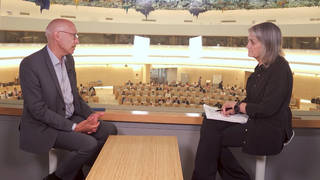
Topics
Leaders from Argentina, Bolivia, Brazil and Venezuela gathered Thursday for an emergency summit do discuss Bolivia’s decision to nationalize its natural gas fields and refineries. We speak with Larry Birns of the Council on Hemispheric Affairs. [includes rush transcript]
In South America, leaders from Argentina, Bolivia, Brazil and Venezuela gathered Thursday for an emergency summit do discuss Bolivia’s decision to nationalize its natural gas fields and refineries.
President Evo Morales’ May Day announcement took many in the region by surprise. Bolivia is threatening to evict any foreign company in six months if it does not renegotiate its contract and hand over control of production to the government.
Brazil and Argentina will likely be affected most by the decision since they import large quantities of Bolivia’s gas. On Thursday, Venezuelan president Hugo Chavez praised Evo Morales’ decision.
- Venezuelan President Hugo Chavez, speaking May 4th, 2006.
Meanwhile Evo Morales defended his call saying the country’s natural resources must be controlled by the people of Bolivia not international corporations.
- President Evo Morales, speaking May 4th, 2006.
We take a look at the latest in Bolivia:
- Larry Birns, director of the Council on Hemispheric Affairs.
Transcript
AMY GOODMAN: In South America, leaders from Argentina, Bolivia, Brazil and Venezuela gathered Thursday for an emergency summit to discuss Bolivia’s decision to nationalize its natural gas fields and refineries. President Evo Morales’s May Day announcement took many in the region by surprise. Bolivia is threatening to evict any foreign company in six months if it doesn’t renegotiate its contract and hand over control of production to the government. Brazil and Argentina will likely be affected most by the decision, since they import large quantities of Bolivia’s gas. On Thursday, Venezuelan President Hugo Chavez praised Evo Morales’s decision.
HUGO CHAVEZ: [translated] We support Bolivia that is pointing the same direction that Venezuela is pointing. We have recovered the control of our natural resources and our mineral riches in a very long and difficult process that even cost us an attempted coup. I can tell you that the process in Bolivia will in no way be traumatic, and I’m sure that everything will turn out well.
JUAN GONZALEZ: That was Venezuelan President Hugo Chavez. Meanwhile, Evo Morales defended his call, saying the country’s natural resources must be controlled by the people of Bolivia, not international corporations.
EVO MORALES: [translated] And we’re going to defend the natural resources. If before, Bolivia was no man’s land, now it is someone’s land. It is the land of Bolivians, especially the indigenous and original people. Private companies, oil companies, transnational companies, if they want to come here and they want to respect Bolivian laws, they are welcome. We are going to make them respect them, but the companies that don’t want to respect Bolivian laws, that don’t want to subordinate themselves to the state, the law, may bad things come to them. The natural resources must be liberated, which means the natural resources must pass to the hands of the Bolivian state under the control of the Bolivian people, and that has begun, and we are going to continue our work without any fear.
AMY GOODMAN: To discuss the latest in Bolivia, we’re joined now in Washington, D.C. by Larry Birns, director of the Council on Hemispheric Affairs. Welcome to Democracy Now!
LARRY BIRNS: Hi, Amy.
AMY GOODMAN: Can you talk about this very dramatic announcement of the nationalizing of gas in Bolivia?
LARRY BIRNS: Well, you know, I don’t quite understand why people say it’s dramatic, when throughout his campaign Evo Morales stressed the fact that there was going to be a takeover, a nationalization of the gas and oil. I think probably what is most dramatic is, here you had a leader who came forth with campaign rhetoric and then actually implemented that rhetoric after taking office.
In recent years, we’ve had multiple presidents in Bolivia and Ecuador and Argentina who were sort of pushed out of office by demonstrations in the streets, because these individuals didn’t fulfill their commitments that they had made during the campaign period. They reneged on these commitments, saying that, 'Yes, we wanted to stand up to the I.M.F., but we can't because we need outside resources, and the only way to get them is to conform to the system.’ And I think that this is an extraordinary achievement, in that he really went through with it, although I feel that this is not really terribly challenging to the energy companies or private multinational energy companies, that they can relate to what Morales has done at no great cost to their financial situation, except that their profits will be somewhat less.
JUAN GONZALEZ: And, Larry Birns, it seems, though, interestingly, that in this particular case, those most affected economically are the countries that now have left-leaning governments. The Spanish government, the socialist government of Spain, which has — Spain has much investment in the region, as well as Brazil and Argentina, the main users of Bolivia’s gas, but the political impact, obviously, reverberates in Washington more, because this kind of idea could spread.
LARRY BIRNS: Well, that’s a good point. What we have here are different variants of “left” and “socialist.” Zapatero is as much socialist as, I guess, the Chilean political system is socialist. Tony Blair belongs to the Socialist International. In Latin America, you have really a significant division between someone like Castro and Chavez and now Morales and really new deal reformers like Kirchner and Lula, and it’s important — I think it’s generally perceived by all those involved that what you want to do is to maintain this broad coalition, because the United States would like to see nothing better than to see Lula and Morales split and Chavez come down on the side of backing Morales, and since Argentina and Brazil will be adversely affected by any price increase — not dramatically, but still affected — there is the possibility of division here. But I think all of these people are wise enough to realize that they must contain this damage, that they must — and perhaps Morales made an error in calling out the troops. That perhaps raised the theatrics of it, but still, it’s all important to me to limit the damage done to this coalition which is now becoming increasingly formidable throughout Latin America.
AMY GOODMAN: Larry Birns of the Council on Hemispheric Affairs, can you talk about the Bolivian workers, the people who have taken to the streets repeatedly, demanding what Evo Morales has done?
LARRY BIRNS: Well, we’re talking about the poorest nation in South America and the second poorest nation in all of Latin America. It’s a nation that has always depended upon its extractive industries — silver, lead, copper and, of course, the hydrocarbons. It has the second largest natural gas field in South America. It’s an extremely important country. The people, the citizenry of the country, have always been living on the margin. There’s a tiny elite that has benefited from the economic system there.
You had great families like the Patiño family, a famous tin family, that benefited from the economics, even though the vast majority of the population operated outside of the system. The people of the Altiplano were the viewers of history, rather than the participants in history, and whenever there was — those rare opportunities when there was a leftist who came to power, he was soon eliminated by either the internal system or the U.S. intelligence factors.
So, this becomes an important moment for Bolivia, because in a sense it signifies that a recuperation has taken place of the resources, and there is at least some distant prospect that these resources would be used for authentic economic development.
AMY GOODMAN: Larry Birns, I want to thank you for being with us, director of the Council on Hemispheric Affairs in Washington D.C.












Media Options